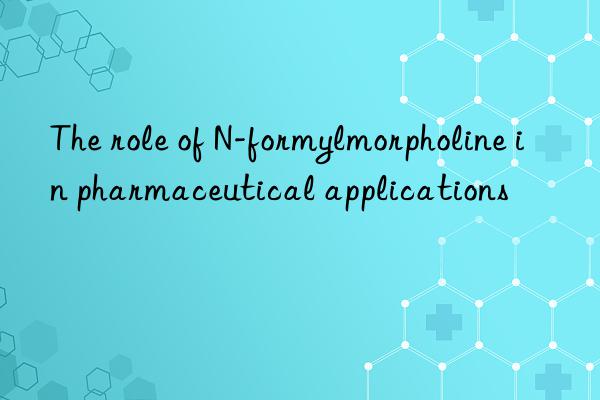
N-Formylmorpholine (NFM), as a multifunctional organic compound, is not only used in the fields of industrial solvents and extraction agents It has a wide range of applications and plays an important role in the field of medicinal chemistry. Its chemical structure gives it unique advantages as an intermediate, reaction medium, and modifier. The following are some important roles of N-formylmorpholine in pharmaceutical applications:
1. Chemical intermediates
N-Formylmorpholine can be used as a key intermediate in the synthesis of various drugs. The chemical reactions it participates in can build complex molecular skeletons, especially when synthesizing drug molecules containing heterocyclic structures. For example, NFM can serve as a formylation reagent to introduce a formyl group, a common functional group in many bioactive molecules. The introduction of formyl groups can not only change the polarity and solubility of the drug, but may also enhance the biological activity or metabolic stability of the drug.
2. Reaction solvent
NFM, as a mild and stable solvent, can promote a variety of chemical reactions without destroying sensitive intermediates. Its use in organic synthesis reduces dependence on traditional toxic or unstable solvents and improves reaction selectivity and yield. Especially in multi-step synthesis processes, the use of N-formylmorpholine can simplify reaction conditions and reduce the formation of by-products, thus improving the overall synthesis efficiency and economy.
3. Improve the physical and chemical properties of drugs
By interacting with drug molecules, N-formylmorpholine can improve the solubility, stability and bioavailability of drugs. For example, by forming NFM derivatives, drug forms with better pharmacokinetic properties can be designed, which can help improve the absorption, distribution, metabolism, and excretion (ADME) properties of the drug.
4. Preparation of drug prodrugs
NFM is also used in the preparation of drug prodrugs, such as the preparation of specifically labeled compounds through reactions involving NFM for drug metabolism research or the development of radiopharmaceuticals. These labeled compounds can help researchers track the metabolic pathways of drugs in the body and evaluate the targeting and safety of drugs.
5. Development of drug delivery systems
NFM can also be used to develop new drug delivery systems. Due to its good solubility and compatibility with other substances, NFM can be used as part of the carrier material to encapsulate drugs to achieve sustained or targeted release, reduce drug side effects and improve therapeutic effects.
6. Antibacterial and antiseptic applications
N-Formylmorpholine has certain antibacterial properties and can be used as a preservative in certain pharmaceutical formulations to extend the validity period of pharmaceutical preparations. This is particularly important for drugs that require long-term storage, ensuring that the drug maintains its efficacy throughout its shelf life.
7. Research Tools
In the process of drug discovery and development, NFM is used as a research tool to screen and optimize drug candidate molecules. It helps chemists understand interactions between molecules, identify potential drug targets, and evaluate the pharmacological activity of compounds.
In summary, the role of N-formylmorpholine in pharmaceutical applications is multifaceted, from serving as a chemical intermediate and solvent, From improving the physicochemical properties of drugs to the development of drug delivery systems and preservatives, NFM has taken its place in modern medicinal chemistry. With the continuous deepening of scientific research, the potential application fields of NFM will be further expanded. However, it is worth noting that the use of NFM needs to strictly follow safety regulations. Considering its potential irritation and toxicity, it must be operated under professional guidance to protect the health and safety of laboratory personnel.
Extended reading:
Toyocat MR Gel balanced catalyst tetramethylhexamethylenediamine Tosoh

 微信扫一扫打赏
微信扫一扫打赏

